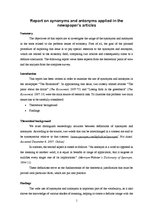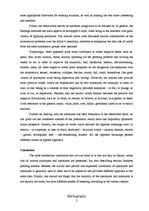-
Synonyms and Antonyms Applied in the Newspaper "The Economist"
Szint:
Főiskola/egyetem
Irodalom:
2 egység
Referenciák:
Használatban
Küldés e-mailben
Az Ön neve:
Adja meg az e-mail-címet, amelyen meg szeretné kapni a linket:
Üdv!
{Your name} szerint érdemes lehet megtekinteni ezt a dokumentumot az eKönyvtárban „Synonyms and Antonyms Applied in the Newspaper "The Economist"”.
A dokumentumra mutató link:
https://www.ekonyvtar.eu/w/267334
A dokumentumra mutató link:
https://www.ekonyvtar.eu/w/267334
E-mail elküldve



